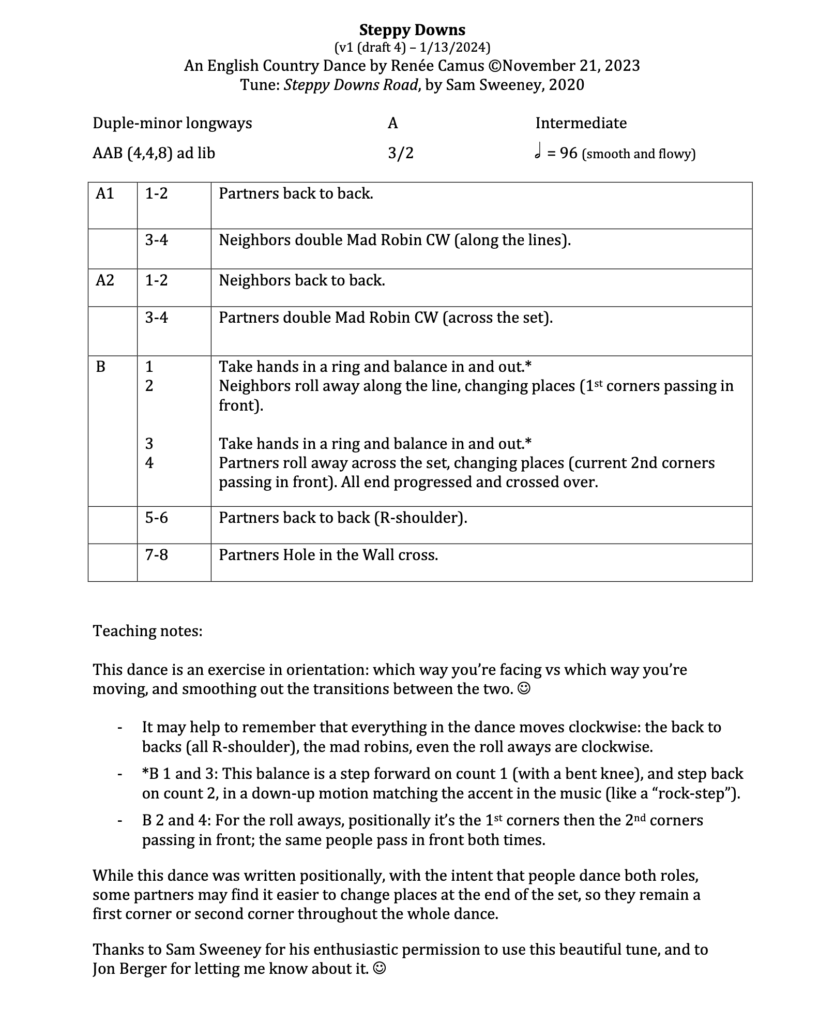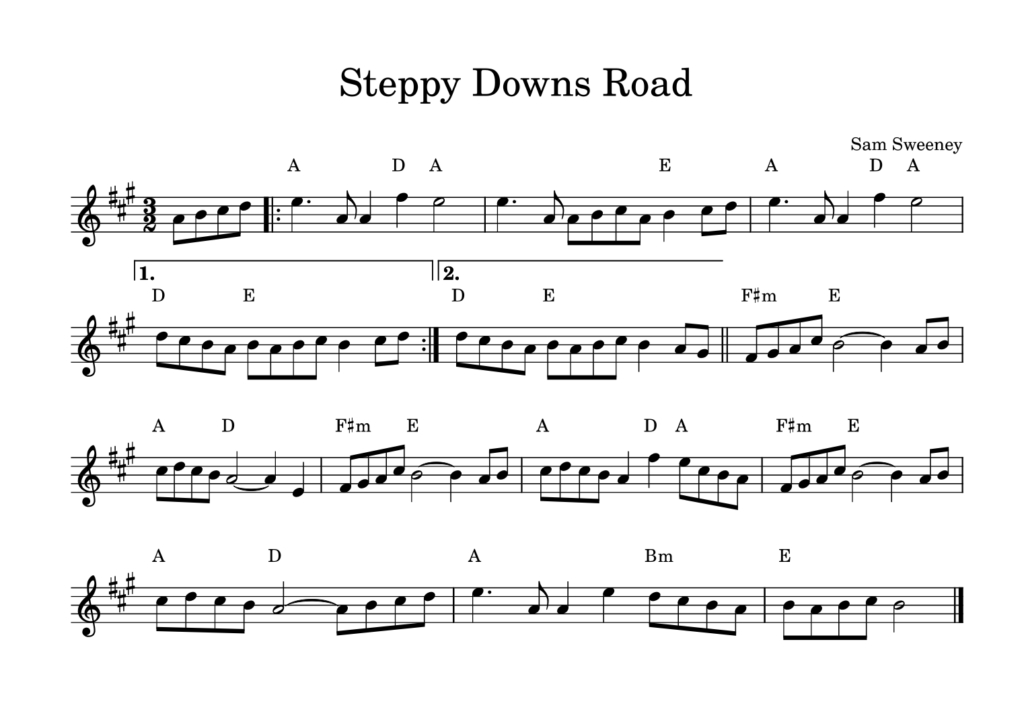Steppy Downs – English Country Dance
This longways English country dance is called Steppy Downs. The tune is Steppy Downs Road, by Sam Sweeney. The recording is by Sam Sweeney and friends (edited to a danceable version by me), and can be found on YouTube. It’s also available on Sam’s album “Unearth Repeat,” available through Hudson Records. Enormous thanks to Sam for his permission to use the tune! Thanks also to Jon Berger, who alerted me to the tune and suggested I work with it. 🙂
This is perhaps a silly thing, but lately I’ve been debating how to date my dances. Sometimes I write a dance and it’s perfect: The first draft is nearly identical to the final draft, it’s tested and approved quickly, and I’m fine leaving the date I wrote it as the date for the dance. As You Were was one of those dances: It was written and tested in the same day, and (miraculously) didn’t need any changes — even though the pandemic meant it couldn’t be danced or released out into the world until two years later. Wah-wah. But that’s another story. 🙂
Steppy Downs, on the other hand, is an example of a dance where I’m not sure what date to assign it. I wrote the first drafts in July 2023, starting with two drastically different versions: One that was simple and not terribly unique, and one that was more challenging — though both of them had pieces of what became the finished dance. Then I revised and tested it in November 2023, again offering two different versions, each one getting closer to what it turned out to be. I finalized the dance on January 13, 2024, and filmed it on January 16 (above). The finalized version is almost identical to version 4 on November 21, 2023, except a slight tweak in who does what in the Bs.
I talked to my husband Alex, a budding screenwriter, about this date issue. He says that as soon as you have a draft of a screenplay that’s solid enough to be complete, then you’re eligible to copyright it. And yet, that date can be different from the official date of publication, when it’s officially released into the world in some way. I’ve primarily been thinking of dances the same way: The date I first write a finished draft is the copyright date, but that feels different from the date of publication, and if a dance changes that much over several months (or even years, like Drunkard’s Walk), then I don’t really want to keep the original date. If there’s an official premiere presentation, for example, the dance I wrote for Sharon Green’s Lifetime Contribution Award for CDSS, then that could serve as the official date. Publication on my website would work, I suppose, but sometimes I don’t get around to posting the dance on the site for a few months, so that doesn’t feel right either.
I’d be curious to hear what other choreographers do. Jenny Beer told me she usually uses the most recent date. That’s probably a good idea, especially with this dance. So that would make the date of this dance January 2024, even though November 2023 was pretty close to what it ended up being.
It’s a fairly challenging dance — again! I had set out to write an easy dance, and once again it didn’t happen. I was trying to do something cool with the syncopated rhythm in the Bs (the “balance”), and the first versions were a little too complex because they used a specified footwork. Eventually, I eased up on the footwork while keeping the basic feel of the syncopation, letting people do whatever they felt comfortable with as long as they had that accented step. Watching the video above, some of these dancers are now naturally doing the footwork I initially wanted… though perhaps that’s because they’ve gotten used to what I had taught them earlier. 🙂
In any case, I loved the complex version so much that I had to keep it. I think it’s a fun exercise in orientation, as I say on the video: Which way you’re facing vs. which way you’re moving, and smoothing out the transitions between the two. A friend taught it recently and said it melted people’s brains! Though I wonder if it’s more challenging for experienced dancers than for beginners, because experienced dancers are used to moving in certain ways. My friend Annette Merritt in Gainesville, FL, taught it to her beginner group (twice, in fact) and they mostly got it. So who knows. Hopefully the fact that it’s a bit complex won’t mean it isn’t danced often, because the tune deserves to be heard more. ![]()
Note that while the dance was written positionally, with the intent that people dance both roles, some partners may find it easier to change places at the end of the set, so they remain a first corner or second corner throughout the whole dance. You’ll see people doing this in the video.
Steppy Downs
An English Country Dance by Renée Camus
© November 21, 2023
Final instructions: January 13, 2024
Tune: Steppy Downs Road, by Sam Sweeney, 2020
Duple-minor longways
Intermediate
AAB (4,4,8)
A
3/2 (half note = 96; smooth and flowy)
| A1 | 1-2 | Partners back to back. |
| 3-4 | Neighbors double Mad Robin CW (along the lines). | |
| A2 | 1-2 | Neighbors back to back. |
| 3-4 | Partners double Mad Robin CW (across the set). | |
| B | 1 | Take hands in a ring and balance in and out.* |
| 2 | Neighbors roll away along the line, changing places (1st corners passing in front). | |
| 3 | Take hands in a ring and balance in and out.* | |
| 4 | Partners roll away across the set, changing places (current 2nd corners passing in front). All end progressed and crossed over. | |
| 5-6 | Partners back to back (R-shoulder). | |
| 7-8 | Partners Hole in the Wall cross. |
Teaching Notes:
This dance is an exercise in orientation: Which way you’re facing vs which way you’re moving, and smoothing out the transitions between the two. 🙂
- It may help to remember that everything in the dance moves clockwise: the back to backs (all R-shoulder), the mad robins, even the roll aways are clockwise.
- *B 1 and 3: This balance is a step forward on count 1 (with a bent knee), and step back on count 2, in a down-up motion matching the accent in the music (like a “rock-step”).
- B 2 and 4: For the roll aways, positionally it’s the 1st corners then the 2nd corners passing in front; the same people pass in front both times.
While this dance was written positionally, with the intent that people dance both roles, some partners may find it easier to change places at the end of the set, so they remain a first corner or second corner throughout the whole dance.
Thanks to Sam Sweeney for his enthusiastic permission to use this beautiful tune, and to Jon Berger for letting me know about it. <3
See more of my English country dance choreographies.

